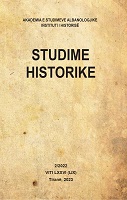PRESIONET KISHTARE DHE POLITIKA E GJUHËS: ROLI KUFINDARËS E KUFITREGUES I PËRDORIMIT TË SHQIPES NË SHEK. XVII-XVIII
ECCLESIASTICAL PRESSURES AND LANGUAGE POLITICS: THE BOUNDARY WORK OF ALBANIAN LANGUAGE IN THE XVII-XVIII CENTURIES
Author(s): Albert DojaSubject(s): Christian Theology and Religion, Albanian Literature, Politics and religion, 17th Century, 18th Century, Eastern Orthodoxy, Sociology of Literature
Published by: Qendra e Studimeve Albanologjike
Keywords: Church politics; Orthodoxy; Albanian;
Summary/Abstract: In this article, I argued that the early religious literature in the Albanian language, which proliferated especially during the seventeenth and eighteenth centuries, in combination with ecclesiastical rivalries and a differential opposition to Ottoman rule, must have promoted an inherent cultural process of differentiation, especially between Greek-speaking and Albanian-speaking Orthodox Christians. Historians of language and written texts have accumulated sufficient empirical evidence to provide a comprehensive picture, and the aim here was not to complement and even less to correct them, simply because historical accounts are always superior regarding the detailed description of available data. At once, they show the lack of social-scientific relevance, which would correct the conventional ideology behind the “dusty bundles” of accumulated data. Indeed, the explanation of historical “truth” is not necessarily found in the archives. Collected data must be understood on the basis of a functioning rationale, which cannot be in the data since they are what needs to be explained. A working assumption is required to face the observable reality of social phenomena, which do not teach anything and are not even observable except from the viewpoint of the assumption that is concerned with them. Albanian studies remain fixated with issues of the immutable origin and autochthony of Albanian identity, which is uncritically defined by means of historical, linguistic, cultural, or social data, while critical questions of how issues of processual identity dynamics are articulated with fixed documented data are never asked. It is precisely this attitude that has compromised a phenomenon polluted by the search for an eternal and unchanged autochthonous Albanian identity at any cost. What is needed here is to make sense of the important historical, cultural, and political role that early religious texts in the Albanian language must have played during the seventeenth and eighteenth centuries. Following a distinctively anthropological approach based on available data from both archival and published sources, I did not offer a description however detailed or based on historical research however exhaustive, but a theoretical interpretation of the positive and negative reactions that contributed at that time to a boundary work of cultural differentiation. In particular, the boundary work of the social reorganization of linguistic and cultural differences is examined without taking into account neither ethnonationalist nor self-explanatory notions and determinations. The question is to move attention from the ethnic or proto-national notions and determinations of identity processes, which have long plagued both nationalist historiographies and postmodernist approaches, to the unconscious symbolic processes of formation, negotiation, contestation, and redefinition of ethnic group boundaries. These processes do not rule out but are a prerequisite to intergroup exchange and communication, just as they are a condition of peaceful coexistence or conflict and violence.
Journal: Studime Historike
- Issue Year: 2022
- Issue No: 02
- Page Range: 73-105
- Page Count: 33
- Language: Albanian
- Content File-PDF

